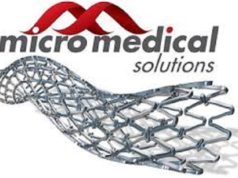
Low-frequency, high-intensity ultrasound energy delivery followed by percutaneous transluminal angioplasty (PTA) may improve clinical outcomes in below-the-knee (BTK) lesions without the need for a drug-eluting device, but a larger randomised study is needed to confirm these results. This was the main conclusion presented by Costantino Del Giudice during the ULYSSE registry late-breaking trial presentation at the 2019 Vascular Interventional Advances conference (VIVA) in Las Vegas (4–7 November).
The ULYSSE registry is a retrospective, nonrandomised, single-centre study evaluating the safety and the efficacy of ultrasoundplasty before angioplasty to treat below-the-knee (BTK) lesions in 22 critical limb ischemia (CLI) patients (35 BTK lesions). All patients were Rutherford category 4 to 6 and had moderate-severe calcification. Ultrasoundplasty was performed using the Kapani catheter (Apani Corporation), which delivers a local, low-frequency, high-intensity ultrasound energy to the lesion.
The objective of the study was to demonstrate that locally delivered ultrasound energy may modify plaque structure using microcavitational effects and change plaque compliance without risk of vessel dissection and rupture. Modifications of plaque structure may potentially improve the outcome of a simple balloon angioplasty.
The primary safety outcomes were the major adverse events at 30 days, recurrence of CLI, and surgical or endovascular revascularization at 6 months. The primary efficacy endpoint was angiographic restenosis and target lesion revascularisation at six months. Immediate outcomes showed good results, with 100% technical success and no major adverse events. At six-month angiographic control, primary patency was 97.1%, with 100% ulcer healing and no target lesion revascularisation and no CLI recurrence. At 24 months, freedom from restenosis was 91.4% as evaluated by Doppler ultrasound control, with no target lesion revascularisation and no CLI recurrence. No major adverse events were reported.













